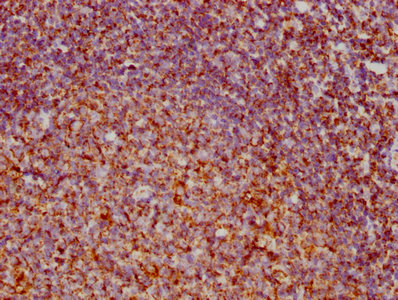PTPN14 Antibody
-
货号:CSB-PA019028GA01HU
-
规格:¥3,900
-
其他:
产品详情
-
Uniprot No.:Q15678
-
基因名:PTPN14
-
别名:Cytoskeletal associated protein tyrosine phosphatase antibody; MGC126803 antibody; PEZ antibody; Phosphatase with ezrin domain antibody; Protein tyrosine phosphatase non receptor type 14 antibody; Protein tyrosine phosphatase pez antibody; Protein-tyrosine phosphatase pez antibody; PTN14_HUMAN antibody; PTP 36 antibody; PTP36 antibody; PTPD 2 antibody; PTPN 14 antibody; PTPN14 antibody; Tyrosine protein phosphatase non receptor type 14 antibody; Tyrosine-protein phosphatase non-receptor type 14 antibody
-
宿主:Rabbit
-
反应种属:Human,Mouse,Rat
-
免疫原:Human PTPN14
-
免疫原种属:Homo sapiens (Human)
-
抗体亚型:IgG
-
纯化方式:Antigen Affinity purified
-
浓度:It differs from different batches. Please contact us to confirm it.
-
保存缓冲液:PBS with 0.1% Sodium Azide, 50% Glycerol, pH 7.3. -20°C, Avoid freeze / thaw cycles.
-
产品提供形式:Liquid
-
应用范围:ELISA,WB,IHC
-
Protocols:
-
储存条件:Upon receipt, store at -20°C or -80°C. Avoid repeated freeze.
-
货期:Basically, we can dispatch the products out in 1-3 working days after receiving your orders. Delivery time maybe differs from different purchasing way or location, please kindly consult your local distributors for specific delivery time.
相关产品
靶点详情
-
功能:Protein tyrosine phosphatase which may play a role in the regulation of lymphangiogenesis, cell-cell adhesion, cell-matrix adhesion, cell migration, cell growth and also regulates TGF-beta gene expression, thereby modulating epithelial-mesenchymal transition. Mediates beta-catenin dephosphorylation at adhesion junctions. Acts as a negative regulator of the oncogenic property of YAP, a downstream target of the hippo pathway, in a cell density-dependent manner. May function as a tumor suppressor.
-
基因功能参考文献:
- p53 deficiency promotes Yap signaling and that PTPN14 and TP53 mutations are mutually exclusive in human cancers. PMID: 29017057
- study determined that high-risk E7 proteins target the proteolysis of the cellular protein tyrosine phosphatase PTPN14 and find that this activity is correlated with the retinoblastoma-independent transforming activity of E7 PMID: 27651363
- PTPN14 is classified as a potential tumor suppressor protein, and is very susceptible to HPV E7-induced proteasome-mediated degradation. PMID: 28100625
- The Hippo signaling pathway was significantly associated with ER-negative breast cancer (pathway level P = 0.02). Gene-based analyses revealed that CDH1 was responsible for the pathway association (P < 0.01),corrected P = 0.02). rs142697907 in PTPN14 was associated with ER-positive breast cancer and rs2456773 in CDK1 with ER-negativity in case-only analysis after gene-level correction PMID: 27485598
- PTPN14, a Pez mammalian homolog, is degraded by overexpressed Su(dx) or Su(dx) homologue WWP1 in mammalian cells. PMID: 25814387
- Findings indicate a pathway involving protein-tyrosine phosphatase D2 PTPD2 (PTPN14) and the lipid second messenger phosphatidic acid that promotes ERBB2 receptor function. PMID: 25681440
- results indicate a potential regulatory role of PTPN14 in the Hippo pathway and demonstrate another layer of regulation in the YAP oncogenic function PMID: 25023289
- Data demonstrate that PTPN14 downregulation can phenocopy YAP activation in mammary epithelial cells and synergize with YAP to induce oncogenic transformation. PMID: 23613971
- Data show that p130 Crk-associated substrate is a direct substrate of PTPN14 and that PTPN14 specifically regulates p130Cas phosphorylation at tyrosine residue 128 in colorectal cancer cells. PMID: 22710723
- YAP is a direct substrate of PTPN14. Results indicate a potential regulatory role of PTPN14 on YAP and demonstrate a novel mechanism in YAP regulation. PMID: 22525271
- YAP forms a protein complex with PTPN14 through the WW domains of YAP and the PPXY motifs of PTPN14. PMID: 22689061
- that PTPN14 acts to suppress cell proliferation by promoting cell density-dependent cytoplasmic translocation of YAP1 PMID: 22948661
- PTPN14 has a role in angiogenesis and/or arteriovenous fate, acting via EphrinB2 and ACVRL1/activin receptor-like kinase 1 PMID: 22233626
- These results suggest a unique and conserved role for PTPN14 in the regulation of lymphatic development in mammals and a nonconserved role in choanal development in humans. PMID: 20826270
- results provide a high-resolution crystal structure of the phosphatase PTPN14, thereby providing insight into its distinct substrate specificity and identifying unique structural features PMID: 16534812
- Dysregulation of TGFbeta signaling as a possible link between Pez mutation and cancer progression. PMID: 18677119
显示更多
收起更多
-
相关疾病:Choanal atresia and lymphedema (CHATLY)
-
亚细胞定位:Cytoplasm. Cytoplasm, cytoskeleton. Nucleus. Note=Translocation into the nucleus is associated with induction of cell proliferation. Partially colocalized with actin filaments at the plasma membrane.
-
蛋白家族:Protein-tyrosine phosphatase family, Non-receptor class subfamily
-
组织特异性:Ubiquitous.
-
数据库链接:
HGNC: 9647
OMIM: 603155
KEGG: hsa:5784
STRING: 9606.ENSP00000355923
UniGene: Hs.193557
Most popular with customers
-
-
YWHAB Recombinant Monoclonal Antibody
Applications: ELISA, WB, IF, FC
Species Reactivity: Human, Mouse, Rat
-
-
-
-
-
-
VDAC1 Recombinant Monoclonal Antibody
Applications: ELISA, WB, IHC
Species Reactivity: Human, Mouse, Rat




















